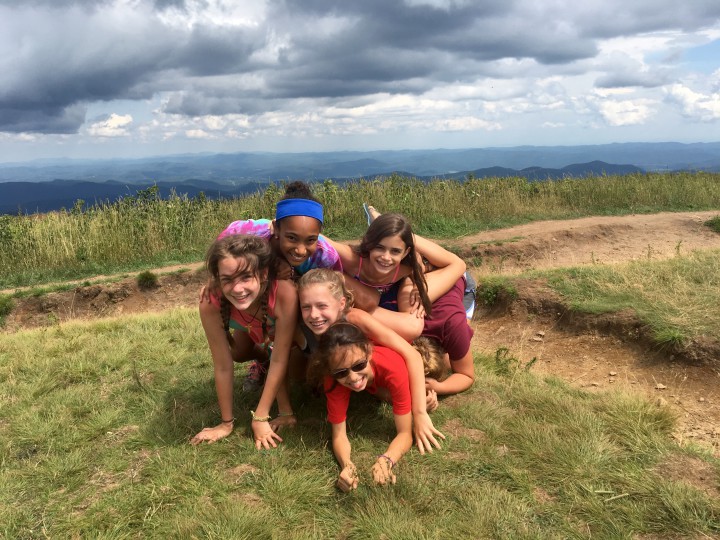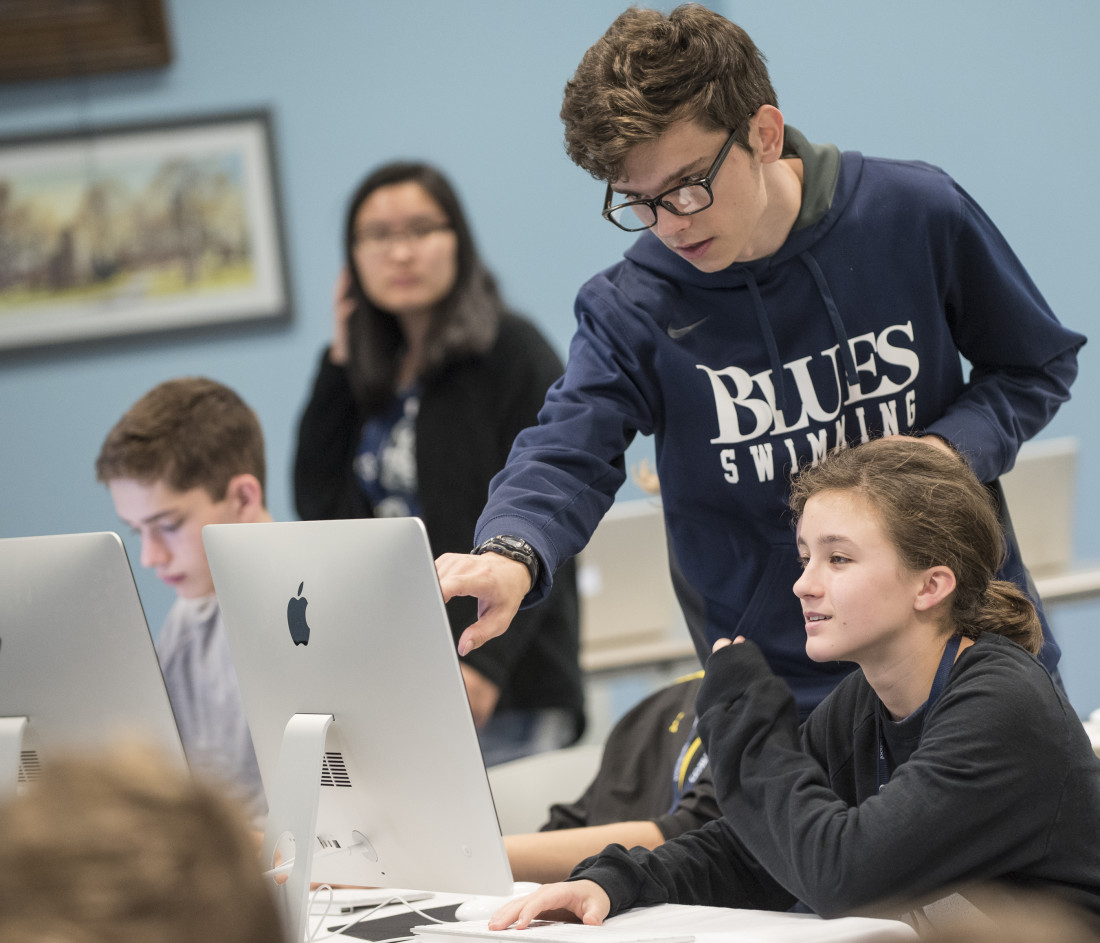Summer camp isn’t just a way to pass the long summer days — it’s a chance for kids to find themselves, camp directors say.
Each year, more than 14 million children and adults attend camps in the United States, the American Camp Association reports. With everything from day programs to overnight stays to adventure-based offerings, there’s a camp out there for everyone. And they all provide a safe space, away from the expectations of family and friends, where attendees can home in on what they’re good at and explore their passions.
“I tell people that I want to pull the gift out of your child that you may not recognize at home,” says Anne Trufant, co-owner of Camp Kahdalea (for girls) and Camp Chosatonga (for boys) near Brevard. “Camp is a place that, if you have the right kind of staff telling these kids positive messages and giving them powerful affirmations and supporting them, then you are birthing a whole new level of more than just confidence: a whole new set of beliefs in themselves.”
Trufant knows well the truth of her words, because it’s something she experienced herself.
“I was a good student, a good kid,” she explains. “But at camp, people saw things in me that I didn’t see before — things like leadership. It was through their support that I was able to bring out those gifts and develop them. It changed who I was.”
Rustic roots
The summer camp tradition traces back to the Civil War era. In his role as headmaster of The Gunnery school in Connecticut, Frederick William Gunn, known as the father of recreational camping, began taking his students on extended nature treks in the early 1860s. By the late 1870s, Americans had begun establishing more camps where boys could toughen up by learning to “rough it.” Soon, girls were also attending camps aimed at fighting the scourge of “indoor-ness” and putting kids in touch with Mother Nature.
At the turn of the last century, there were about 100 camps in the U.S. But the trend caught on quickly, and by 1918, there were more than 1,000, author Livia Gershon wrote in the online journal JSTOR Daily. Many of them were wilderness outposts where one could fish, swim, ride and play outdoor games.
Today, according to the American Camp Association, there are more than 14,000 day and resident camps across the U.S.
At Camp Kahdalea and Camp Chosatonga, Anne and her husband, David Trufant, strive to maintain a traditional approach. “I hope we haven’t evolved too much away from that,” he says. “A lot of camps are like resorts now, but ours is more simple, more rustic.”
With its own lake, archery range, dining hall and chapel, Camp Bob, an arm of the Kanuga Conference, Retreat and Camp Center in Hendersonville, shares that philosophy. The day begins at 7:15 a.m., with the 7:45 flag raising followed by breakfast, a morning assembly, cabin cleaning time and activities all cabin members do together. After lunch and a rest period, there are more activities — everything from swimming to archery, as well as service projects and team-building exercises. The day winds down with the flag lowering, dinner, camp gatherings, devotionals and, finally, lights out at 10:15 p.m.
In addition to the group activities, campers also choose from a list of pursuits to explore on their own, ranging from photography to performing arts to nature walks to arts and crafts. Campers are grouped by age and housed in cabins where the counselors and volunteers also sleep. Meals (including vegetarian options) are served family style, and kids can eat as much as they want.
Leave your phone at home
More traditional camps tend to emphasize interaction with nature while limiting access to technology. A 2017 American Camp Association survey found that more than 90 percent of the organization’s accredited camps don’t allow access to cellphones, and more than 80 percent don’t allow internet access.

“We do make them leave their phones, but most of them find that they can’t get a signal out here anyway,” David Trufant explains. “Really, we don’t see the kids having much difficulty with it. Occasionally,” he notes, “kids get up and say life without their phones is much better.”
But parents who are used to having 24/7 access to their children, he continues, don’t always agree.
“It seems to me that parents have a much more difficult time with it than the kids do. The kids have a lot of activities, so they really don’t have time to think about their phones. But we’ll have some parents every year who call frequently to find out about their child and make sure they’re doing OK. I think the separation is good for the parents and the kids.”
Accordingly, many camps now post frequently to social media so parents can see their children, and at Kahdalea and Chosatonga, campers are required to send one letter home each week. Counselors also write to all the parents, letting them know how their children are doing.
De-emphasizing technology, says Anne Truffant, can open the door to other valuable experiences. She remembers one girl who came to camp extremely anxious. Trufant later learned that the girl was being bullied by schoolmates, who were sending her harassing text messages.
“This is a place where these kids can be unplugged, where they can breathe,” says Trufant. “This is a place where they can connect with other kids on a personal level, and where they’re surrounded with role models that they can play with and get muddy with and talk to and look up to.”
Diverse choices
These days, however, there are also many nontraditional options. Overnight camps focus on everything from science to nature explorations to art to life skills to college prep. And day camps may offer programs in filmmaking, rock music, painting, fiber arts, science, Spanish-language skills and even boffing (a fully padded and safety-tested martial art).
At Asheville School, an app-development camp helps kids learn about computer science. In weeklong day camps, as well as a new overnight camp, students learn how to build apps using Swift (Apple’s new programming language), work in Xcode and explore iOS SDK.
Launched in 2014, the day camp gives attendees valuable career skills while teaching them things like logic, critical thinking and problem-solving, notes director of communications Bob Williams, who teaches the programs along with director of technology Charles Long.
“These kids have a lot of digital skills, but they don’t understand the computer science behind it,” says Williams. “So while they may be tech-savvy, they are more consumers of technology than computer scientists. We teach them to be more analytical in their thinking and use the STEM [science, technology, engineering and math] skills that they learn in school — skills that are going to be so important in the coming age of [artificial intelligence].”
The program is growing by leaps and bounds, Williams reports. In its first year, the camp drew 11 students; last year, there were more than 40. This year’s programs are attracting people from as far away as Germany and the Bahamas.
But just because campers are learning about apps doesn’t mean they have unfettered access to their electronic devices, stresses Williams.
“They’re getting plenty of screen time, but they won’t be on their screens checking social media,” he explains. “They’re going to be on the screen learning about the apps they use and how they are created. They’re going to be looking at those apps in a new way.”
Life skills

Teaching kids how to use technology and build things with it, rather than maintaining a “technology-free zone,” is one of the hottest trends this year, according to the USA Camp Association.
And while traditionalists may bristle at the idea of letting technology in, others point out that learning about it is just as important as learning how to fish or kayak.
“Teaching kids valuable life skills doesn’t just have to include how to start a fire or harvest rainwater,” the association’s blog notes. “Teaching kids about engineering and tech is a vital skill they will need in the future.”
And whether summer camp runs just for the day or spans several weeks, the experience can be life-changing.
“Camps are such an awesome place, with so many different activities,” Anne Trufant maintains. “While there are plenty of things to do during the summer, it’s at camp that a child can learn and experience and grow, and where they’re competing with themselves to see how much better they can get.”



Before you comment
The comments section is here to provide a platform for civil dialogue on the issues we face together as a local community. Xpress is committed to offering this platform for all voices, but when the tone of the discussion gets nasty or strays off topic, we believe many people choose not to participate. Xpress editors are determined to moderate comments to ensure a constructive interchange is maintained. All comments judged not to be in keeping with the spirit of civil discourse will be removed and repeat violators will be banned. See here for our terms of service. Thank you for being part of this effort to promote respectful discussion.